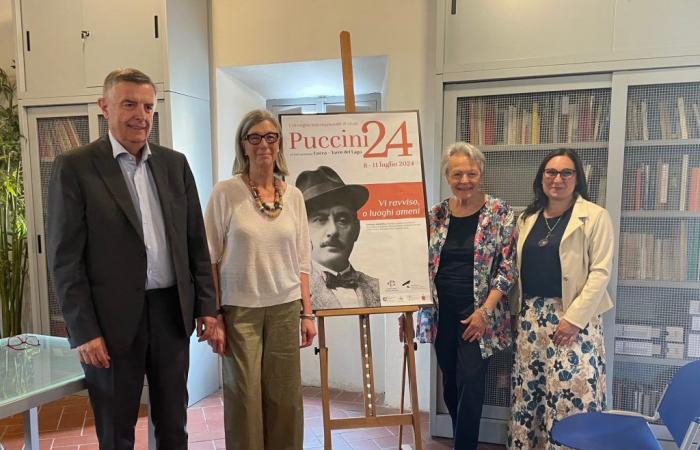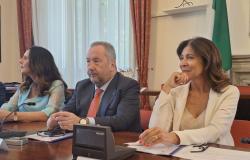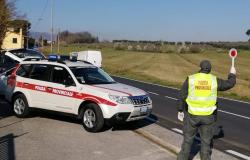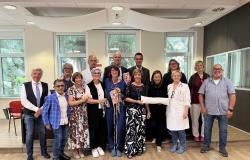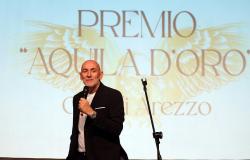An international conference to commemorate the hundredth anniversary of the death of Maestro Giacomo Puccini (Lucca, 1858 – Brussels, 1924) with the participation of over thirty scholars, in Lucca and Torre del Lago, the city where the maestro was born and began his musical career and where he established his chosen residence.
AND Puccini 24 – I perceive you, oh pleasant places the cultural initiative presented this morning and organized by the Giacomo Puccini Study Center and the Simonetta Puccini Foundation for Giacomo Puccini. Present were Maria Pia Mencacci, vice president of the Giacomo Puccini Foundation, who brought greetings from the mayor of Lucca, Mario Pardini, who holds the position of president of the institution; the vice-president of the Cassa di Risparmio di Lucca Foundation, Raffaele Domenici; the director of the Simonetta Puccini Foundation for Giacomo Puccini, Patrizia Mavilla, and the president of the Giacomo Puccini Study Center, Gabriella Biagi Ravenni.
The expected relationships were selected through a call for papers launched many months ago and closed last January 8th. The proposals received were evaluated by a scientific committee led by Michele Girardi, founding member and coordinator of the scientific committee of the Giacomo Puccini Study Center, and formed by Alessandra Campana, Richard Erkens, Federico Fornoni, Arthur Groos, Riccardo Pecci, Manuel Rossi.
The interventions will examine in depth all aspects of the maestro’s work: the literary sources and musical forms, the problems of critical editions, the musical dramaturgy and the staging; but also the documentary heritage, with the correspondence and all the archive sources that provide new information on the biography and creative processes of Giacomo Puccini.
The first session of the event will be held from Monday 8th to Thursday 11th July between Lucca and Torre del Lago. Puccini 24. The second is scheduled in Venice from 2 to 4 October and will focus its historical gaze on the influences that Puccini’s works have exerted on the music and dramaturgy of the 20th and 21st centuries, on the echoes in contemporary and recent works and on the transpositions of Puccini’s theater in other media. The two appointments were preceded by a rich prologue in two conference stages of international importance, in Siena (Giacomo Puccini in the history of the Italian language19-20 March 2024) and in Lyon (Giacomo Puccini, 1924-2024: Puccini et la France20-22 March 2024), organized by the Study Center in collaboration with the city’s academic institutions and the Italian Cultural Institute of Lyon.
Thus the coordinator of the scientific committee, Michael Girardi: “The conferences open up new perspectives on an author: from the comparison between specialists, and from the results of their research, a wealth of ideas emerges which reverberates on institutional, artistic and cultural initiatives. The Giacomo Puccini Study Center has worked in this direction since its foundation (1996): less rhetoric and serious insights to honor a great composer, the rest follows and many have rediscovered Puccini, not only popular, but a cultured, modern and cosmopolitan. After the one hundred and fiftieth anniversary of his birth (2008), the Lucca Study Center has to celebrate the centenary of his death: the close collaboration with the Simonetta Puccini Foundation of Torre del Lago, custodian of the master’s thousand secrets, is one of the important innovations that pave a new future of discoveries”.
Add Giovanni Godipresident of the Simonetta Puccini Foundation for Giacomo Puccini: “The Simonetta Puccini Foundation is pleased to actively participate in the conference Puccini 24 which will be hosted on July 10 and 11 in Torre del Lago and which represents a precious opportunity for the study and rediscovery of Giacomo Puccini and his artistic production, also through the study of the documents of the Puccini Archive that Simonetta has collected and preserved. We are therefore honored to make the maestro’s personal papers available to this large group of scholars”.
The selected scholars come from the United States, Switzerland, Germany, Great Britain, Poland and Italy. The conference will open at 2.30 pm next Monday (8 July) with institutional greetings, in the room named after Vincenzo Da Massa Carrara of the San Micheletto complex in Lucca, kindly granted by Cassa di Risparmio di Lucca FoundationThe work will get into full swing with a focus on The drama of historiographychaired by Gabriella Biagi Ravenni, president of the Giacomo Puccini Study Center. First speaker is Arthur Groos (Cornell University, New York), founding member of the Giacomo Puccini Study Center, with the intervention Versions of Madama Butterfly: Pinkerton, comedy, fin-de-siècle racial discourse, and they will discuss it Federico Fornonialready winner of the Rotary Puccini Research Award (University of Bergamo) and Michael Girardi (University of Venice, Ca’ Foscari). The report will follow Matthew Giuggioli (University of Roma Tre), winner of the 2021 Rotary Puccini Research Award, on The anatomy of violence in the second act of Tosca and that of Arnold Jacobshagen (University of Music and Dance Cologne) who explore a current, turning-of-the-century theme such as Karl Gustav Fellerer and Puccini research in Nazi Germany.
The second day in Lucca will begin on Tuesday 9th July at 10am with Puccini globalfocus on translation and transposition chaired by Virgilio Bernardoni (University of Bergamo), vice-president of the Giacomo Puccini Study Centre and president of the National Edition of Giacomo Puccini’s works. The first speech will be by Joshua Neumann (Academy of Sciences and Literature, Mainz) con Calaf? Calauf? – Performing & recording Turandot in translation. The floor will be given next Agnieszka M. Andrejczyk (Fryderyk Chopin University of music, Warsaw) with a paper entitled Translating an operatic libretto and finally, Siel Agugliaro (University of Pisa) with Dieter Schickling’s catalog migrates online.
Between dramaturgy and vocality is the title designed to collect the interventions of the second and last afternoon in Lucca chaired by Emanuele Senica (La Sapienza University of Rome) member of the board of directors and of the scientific committee of the Giacomo Puccini Study Center. At 15 Arman Schwartz (University of Notre-Dame, Indiana) will present Sharpless, Giuseppe De Luca, and the ‘useless baritone’followed by Marco Beghelli (University of Bologna) with Appoggiatura and other prosodic elements from bel canto to verismo: the example of PucciniThe day will end with the work of Jane Sylvester (University of Missouri-Kansas City, Missouri) entitled From innocence to experience: contrasts of Puccini’s performative temporalities.
The third day of Puccini 24 – I perceive you, oh pleasant places will move to the Simonetta Puccini auditorium in Torre del Lago, in the building adjacent to the Villa museum where the maestro lived and home to the Simonetta Puccini Foundation for Giacomo Puccini. At 10 am on Wednesday 10 July the speakers will discuss the Politics of the scenemoment presided over by Alessandra Campana (Tufts University, Massachusetts), member of the scientific committee of the Giacomo Puccini Study Center. Opening speech by Joseph Montemagno (Vincenzo Bellini Conservatory, Catania) entitled Open the Border: Turandot According to Robert Wilson and Ai Weiweifollowed by that of Anne Monique Pace (University of Chicago, Illinois), Questioning the Politics of Commedia dell’Arte in Puccini’s TurandotThe morning’s work will conclude with Harry Rose (Brown University, Rhode Island) who will present the report «Give me a sign of grace!»: Giovacchino Forzano’s dramaturgy of presence and Puccini’s Suor Angelica.
In the afternoon, from 3pm, it will be the turn of the focus on Devices and apparatuschaired by Federico Fornoni (University of Bergamo). The first intervention scheduled is that of Davide Ceriani (Rowan University, New Jersey) e in George Farabegoli (Marie Curie Technical and Technological Institute, Savignano sul Rubicone) on Origins, reasons and consequences of Puccini’s preference for mechanical musical instruments. The word will therefore pass to Luke John Logi (Teatro del Maggio musica fiorentino) with Some empirical criteria for harmonic and stylistic analysis in Puccini and, finally, ad Andrew Davis (University of Houston, Texas) for the report Reconsidering Suor Angelica.
The last day will begin at 9.30 with the four interventions scheduled for the works chaired by Michele Girardigathered under the title The cloak and other stories. Will start Francesco Fontanelli (Humboldt University, Berlin) with The cloak revealed: the sources of the libretto and the conquest of a new dramaturgy; will continue Francis Caesar (University of Venice Ca’ Foscari) with the intervention On two files of autographed sketches relating to the Tabarro, which were unknown until now; Emanuel D’Angelo (Academy of Fine Arts, Bari) will propose Da La houppelande al Tabarro and, finally, Andrea Palandri (Université de Genève) will close the morning proceedings with The libretto in the study of the creative process: the two ‘Torrelago’ cases of Madama Butterfly and La Fanciulla del West.
The conference will end in the afternoon with the session New perspectives on archiveschaired by Diana Toccafondi of the Simonetta Puccini Foundation for Giacomo Puccini. He will speak at the opening Claudia Borgia (Archival and Bibliographic Superintendency of Tuscany) with One, none, one hundred thousand. Notes for a history of the Puccini archives. The report will follow Manuel Rossi (Simonetta Puccini Foundation for Giacomo Puccini) su Archive or museum? The Puccini papers of Torre del Lago is that Eugenia Di Rocco (University of Pisa) focused on Puccini photographer. Impressions from the cardsThe conference will continue with a general discussion before the conclusions of the scientific committee.

